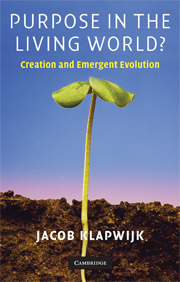Book contents
- Frontmatter
- Contents
- List of figures
- Preface
- Introduction
- 1 Does life on earth have a purpose?
- 2 Creationism, Intelligent Design, and Augustine's idea of time
- 3 Darwin, neo-Darwinism, and the naturalistic continuity claim
- 4 Miller's pre-biotic broth and the premises of evolutionism
- 5 A cold shudder along Darwin's back
- 6 The emergence theory of Morgan and Alexander
- 7 Luctor et emergo: what is emergent evolution?
- 8 Toward a general theory of emergent evolution
- 9 Hominization and the philosophy of mind
- 10 Augustinian faith and evolutionary science
- 11 The organism is a whole. The world is a habitat
- 12 The slumbering temptation of essentialism
- 13 Questions surrounding the emergence process
- 14 Enkapsis in nature. Is there an Omega point?
- Bibliography
- Index
14 - Enkapsis in nature. Is there an Omega point?
Published online by Cambridge University Press: 05 June 2012
- Frontmatter
- Contents
- List of figures
- Preface
- Introduction
- 1 Does life on earth have a purpose?
- 2 Creationism, Intelligent Design, and Augustine's idea of time
- 3 Darwin, neo-Darwinism, and the naturalistic continuity claim
- 4 Miller's pre-biotic broth and the premises of evolutionism
- 5 A cold shudder along Darwin's back
- 6 The emergence theory of Morgan and Alexander
- 7 Luctor et emergo: what is emergent evolution?
- 8 Toward a general theory of emergent evolution
- 9 Hominization and the philosophy of mind
- 10 Augustinian faith and evolutionary science
- 11 The organism is a whole. The world is a habitat
- 12 The slumbering temptation of essentialism
- 13 Questions surrounding the emergence process
- 14 Enkapsis in nature. Is there an Omega point?
- Bibliography
- Index
Summary
At the beginning of this book I posed the question: did the process of evolution produce living organisms including human beings strictly by chance? Or can evolution theory also be in harmony with the view that the world has a purpose and that human existence gives evidence of a plan or of divine intentions? Human history demonstrates such exceptional examples of wisdom, creativity, and moral dedication that the thought of an ultimate purpose of life forces itself upon us, even if these expectations are assailed by disappointment and bewilderment. For the world is presented to us in the Bible as a reality that has been created by God with a purpose: it is on the way toward its blessed final destiny, the kingdom of God.
In this final chapter we return to the quest for purpose and meaning. I want to focus our quest on these four questions: In nature, do perspectives of meaning not become apparent in the subordination of the physical to above-physical levels, and of nature as a whole to the actions of human beings as the bearers of culture (section 1)? Can these perspectives of meaning also transcend the interactions between nature and culture and be included in a religious perspective of meaning, in which we experience world events as subordinate to God's dealing with the world to open the path for His kingdom (section 2)?
- Type
- Chapter
- Information
- Purpose in the Living World?Creation and Emergent Evolution, pp. 275 - 292Publisher: Cambridge University PressPrint publication year: 2008

